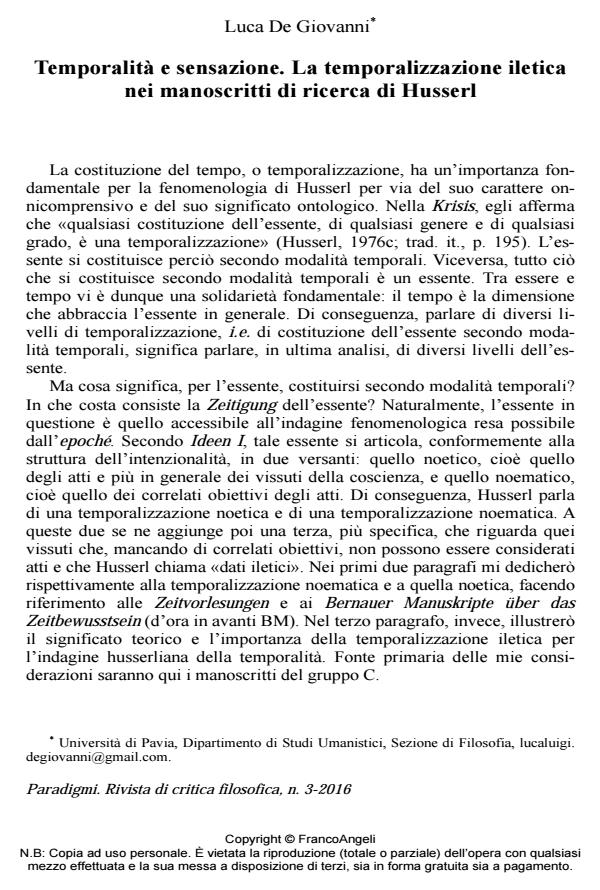Temporalità e sensazione. La temporalizzazione iletica nei manoscritti di ricerca di Husserl
Journal title PARADIGMI
Author/s Luca De Giovanni
Publishing Year 2017 Issue 2016/3
Language English Pages 12 P. 177-188 File size 159 KB
DOI 10.3280/PARA2016-003012
DOI is like a bar code for intellectual property: to have more infomation
click here
Below, you can see the article first page
If you want to buy this article in PDF format, you can do it, following the instructions to buy download credits

FrancoAngeli is member of Publishers International Linking Association, Inc (PILA), a not-for-profit association which run the CrossRef service enabling links to and from online scholarly content.
This article aims to understand the articulation of the three different levels of temporal constitution in Husserl’s phenomenology. The first paragraph explores the meaning of noematic temporalization, i.e. the temporal constitution of the objects of experience. The second paragraph is dedicated to noetic temporalization, i.e. the temporal constitution of the acts through which the I experiences objects. Finally, the third paragraph deals with the temporal constitution of hyle, or sensation. It clarifies the status of hyletic temporalization and analyzes its relationship with noetic temporalization, sc. egoic temporalization, arguing for the primacy of the former over the latter. .
Keywords: Ego, Phenomenology, Husserl, Hyle, Sensation, Temporality
- Bernet R., Kern I. und Marbach E. (1989). Edmund Husserl. Darstellung seines Denkens. Hamburg: Felix Meiner Verlag (trad. it.: Edmund Husserl. Bologna: Il Mulino, 1992).
- Depraz N. (1994). Temporalité et affection dans les manuscrits tardifs sur la temporalité (1929-1935) de Husserl. Alter, 2: 63-86.
- Held K. (1966). Lebendige Gegenwart. Die Frage nach der Seinsweise des transzendentalen Ich bei Edmund Husserl, entwickelt am Leitfaden der Zeitproblematik. Den Haag: Martinus Nijhoff, DOI: 10.1007/978-94-017-2059-5
- Husserl E. (1966). Analysen zur passiven Synthesis. Den Haag: Martinus Nijhoff (trad. it.: Lezioni sulla sintesi passiva. Milano: Guerini, 1993).
- Husserl E. (1969). Zur Phänomenologie des inneren Zeitbewusstsein (1893-1917). Den Haag: Martinus Nijhoff (trad. it.: Per la fenomenologia della coscienza interna del tempo (1893-1917). Milano: Franco Angeli, 1992).
- Husserl E. (1976a). Ideen zu einer reinen Phänomenologie und phänomenologischen Philosophie. Erstes Buch: Allgemeine Einführung in die reine Phänomenologie. Den Haag: Martinus Nijhoff (trad. it.: Idee per una fenomenologia pura e una filosofia fenomenologica. Libro primo: Introduzione alla fenomenologia pura. Torino: Einaudi, 2002), DOI: 10.1515/9783110916096
- Husserl E. (1976b). Ideen zu einer reinen Phänomenologie und phänomenologischen Philosophie. Zweites Buch: Phänomenologische Untersuchungen zur Konstitution. Den Haag: Martinus Nijhoff (trad. it.: Idee per una fenomenologia pura e una filosofia fenomenologica. Libro secondo: Ricerche sopra la costituzione. Torino: Einaudi, 2002).
- Husserl E. (1976c). Die Krisis der europäischen Wissenschaften und die transzendentale Phänomenologie. Den Haag: Martinus Nijhoff (trad. it.: La crisi delle scienze europee e la fenomenologia trascendentale. Milano: Il Saggiatore, 1997), DOI: 10.1007/978-94-010-1335-2
- Husserl E. (2001). Die Bernauer Manuskripte über das Zeitbewusstsein (1917/18). Dordrecht: Springer.
- Husserl E. (2006). Späte Texte über Zeitkonstitution (1929-1934): Die C-Manuskripte. Dordrecht: Springer.
- Kortooms T. (2002). Phenomenology of time. Edmund Husserl’s analysis of time-consciousness. Dordrecht: Kluwer), DOI: 10.1007/978-94-015-9918-4
- Lohmar D. (2010). On the constitution of the time of the world: The emergence of objective time on the ground of subjective time. In: Lohmar D., Yamaguchi I., eds. On time – New contributions to the Husserlian phenomenology of time. Dordrecht: Springer: 115-136, DOI: 10.1007/978-90-481-8766-9_6
- McTaggart J.E. (1908). The unreality of time. Mind: A Quarterly Review of Psychology and Philosophy, 17: 456-473.
- Penna A. (2007). La costituzione temporale nella fenomenologia husserliana. Napoli: Il Mulino.
- Piana G. (1979). Elementi di una dottrina dell’esperienza. Milano: Il Saggiatore.
- Ricoeur P. (1985). Temps et récit. Tome III: Le temps raconté. Paris: Les Seuil (trad. it.: Tempo e racconto. Volume 3: Il tempo raccontato, Milano: Jaca Book, 1988).
- Vanzago L. (2008). Coscienza e alterità. La soggettività fenomenologia nelle Me dita zioni cartesiane e nei manoscritti di ricerca di Husserl. Milano: Mimesis.
- Vergani M. (2003). Saggio introduttivo. In: Vergani M., a cura di. Metodo fenomenologico statico e genetico. M. Milano: Il Saggiatore.
- Zahavi D. (2003). Inner time-consciousness and pre-reflective self-awareness. In: Welton D., eds. The new Husserl: A critical reader. Bloomington: Indiana University Press: 157-180.
Luca De Giovanni, Temporalità e sensazione. La temporalizzazione iletica nei manoscritti di ricerca di Husserl in "PARADIGMI" 3/2016, pp 177-188, DOI: 10.3280/PARA2016-003012